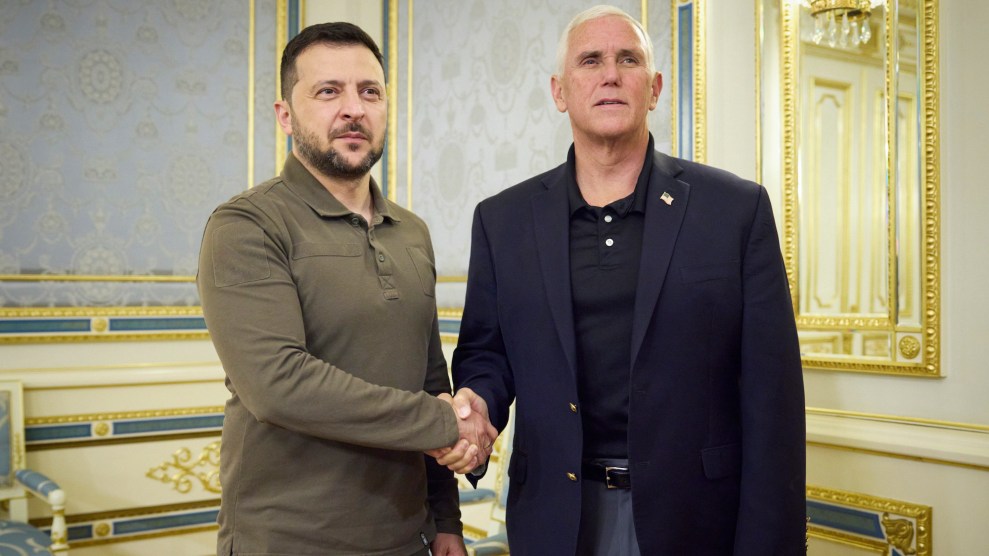
Ukrainian Presidential Press Office/AP
This week, former Vice President Mike Pence made a surprise trip to Ukraine, where he met with President Volodymyr Zelenskyy. The trip draws a contrast between himself and fellow presidential candidates like Donald Trump and Ron DeSantis, who’ve been skeptical of the United States’ involvement in Ukraine.
Pence is the first Republican presidential candidate to meet with Zelenskyy. Biden met the president of Ukraine in May. “America is the leader of the free world,” Pence told CNN’s Erin Burnett. “We’re the arsenal of democracy.”
It’s an interesting contrast for Pence. The former sidekick to Trump—a president who notably shifted away from the hawkish rhetoric, if not always politics, of George W. Bush’s Republican party—is positioning himself as a neoconservative. Well, sort of: Pence evoked the “Reagan doctrine,” not the Iraq war, and said that sending weapons to Ukraine was like sending weapons to people fighting communism (or what the United States considered to be communism).
While in Ukraine, Pence called on the Biden administration to send military aid more quickly. The criticism seems pro forma. In reality, Pence’s position is far closer to Biden’s—both want to arm Ukraine but oppose sending US troops to the country—than it is to his Republican rivals and the base of his party.
A poll from NBC News this month found that 52 percent of Republican primary voters would be less likely to support a candidate who supports sending more money and weapons to Ukraine. Only 28 percent said they would be more likely to do so.
Before officially entering the race in May, DeSantis initially framed the Russian invasion of Ukraine as a “territorial dispute.” After the claim angered Republican donors, DeSantis called Russian president Vladimir Putin a “war criminal.” But DeSantis still appears well aware that support for Ukraine is not a winning issue in the primary.
At a CNN town last month, Trump called Putin’s invasion of Ukraine a “bad mistake.” But he refrained from calling Putin a war criminal by saying that doing so would make it harder to end the war. Trump claimed that he would be able to end the war within 24 hours of returning to the presidency.
Trump is currently polling above 50 percent in the primary. DeSantis is roughly 25 points behind him. Pence is in a distant third. Despite having left the White House less than three years ago, he is only about two points ahead of Vivek Ramaswamy, a self-funding millennial.
The odds of a Ukraine trip bringing Pence closer to victory are slim in today’s climate. But given the current state of his campaign, just making news counts as a win.








